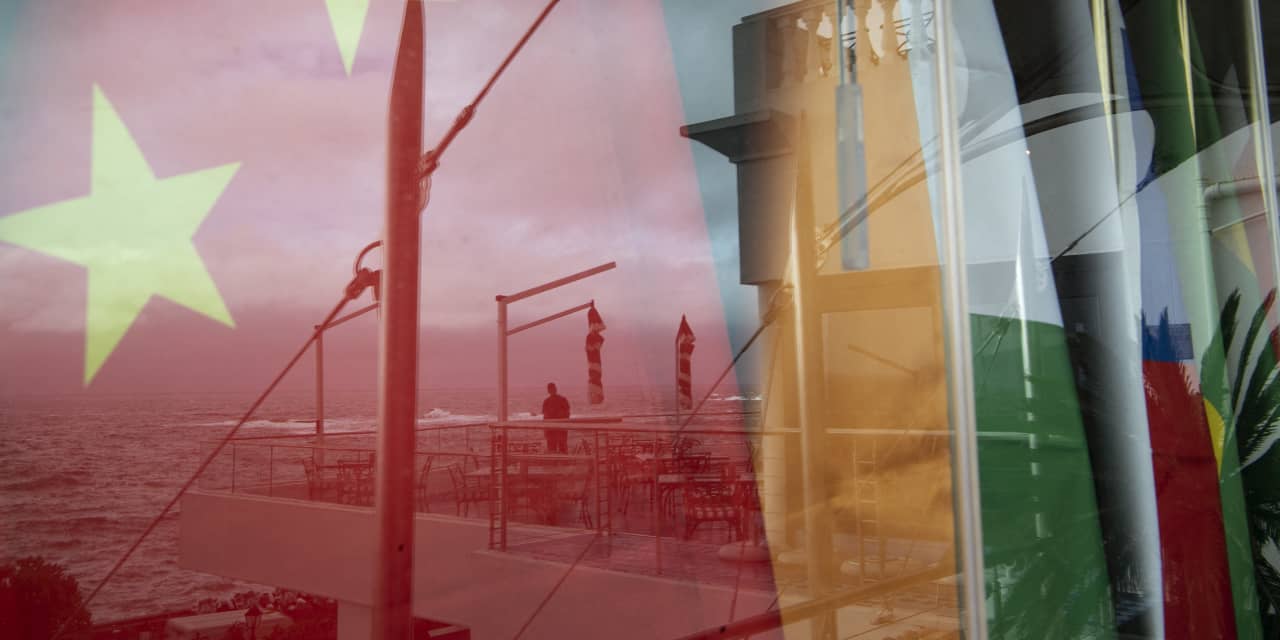A view of a reflection in front of the national flags of the BRICS countries during the BRICS Foreign Ministers Meeting in Cape Town, on June 2, 2023.
Rodger Bosch/AFP/Getty Images
About the author: Edward Price is principal at Ergo, a global intelligence, consulting, and forecasting firm. A former British trade official, he also teaches at New York University’s Center for Global Affairs.
As Pax Americana disintegrates, the U.S. needs friends. Relying on the U.K., Germany, and Japan isn’t enough. Instead, America needs the VIPS: Vietnam, India, the Philippines, and Saudi Arabia.
Here’s why.
In 2001, Goldman Sachs analyst Jim O’Neill came up with a new acronym: BRIC. It stood for Brazil, Russia, India and China. O’Neill thought the economic growth of these countries would exceed that of the Group of Seven, made up of the U.S. and its fellow advanced democracies. For these emerging-markets, world-beating growth sounded like a good idea. In 2006, the BRIC nations founded an informal grouping and, in 2011, South Africa joined. Thus, the BRICS were born.
And lo, in 2023, the BRICS announced they had surpassed the G7 in growth.
The BRICS are making plenty of other news. There is talk of a gold-backed BRICS currency, one designed to chip away at dollar dominance. Meanwhile, Russia is prosecuting a ground war in Europe, and China is eyeballing Taiwan. In this world of challenges, the U.S. needs strategic friends. Going it alone ain’t an option. And America needs some friends more than others.
This brings us back to our acronym, VIPS. These are the countries Uncle Sam must really woo in the 21st century: Vietnam, India, the Philippines and Saudi Arabia. Each is far from a firm American ally. But each is also critical to America’s strategic success. They could prove to be the strategic counterweight to the BRICS.
The “V” is Vietnam. Vietnam’s geopolitical significance is overwhelming. The site of a devastating 20th-century war, Vietnam is not out of history’s crosshairs yet. Hanoi, the Vietnamese capital, has any number of territorial and maritime disputes with Beijing. And the Vietnamese do not much appreciate the idea of China’s regional dominance. Despite their bad blood, Hanoi and Washington are aligned on where the modern threats come from: China. Vietnam also has a pretty good track record when it comes to martial endeavors. After kicking the French and Americans out, Vietnam thumped China in 1979 too.
In short, America needs Vietnam to keep China from dominating Southeast Asia on land.
India, of course, is the “I”. Here’s the rub: it is a BRICS nation. But India will play its cards as suits India. And what a fantastic hand India has. Big economy. Good demographics. India essentially has the deciding vote in the 21st century. If India stays out of the geopolitical rat race, or aligns with China, the U.S. will have a far harder time. America must woo India, a member of the BRICS, into becoming a member of the VIPS.
Put simply, American democracy needs Indian democracy to check Chinese Communism.
The Philippines, our “P,” are also super important. Nestled between the South China Sea and Philippines Sea, they are a multidirectional strategic platform for anyone lucky enough to be their pal. And are we their pal? Yes. At the turn of the last century, the U.S. declined the annexation of the Philippines. Ever since, relations have floated around between good, bad and indifferent. The Philippines are an ally. But former President Rodrigo Duterte was a good illustration of regional precariousness. He pursued an “independent” foreign policy, and it was never quite clear whether he had Beijing or Washington D.C. in his iPhone favorites.
Nonetheless, the U.S. needs the Philippines to stop China from dominating Southeast Asia by sea.
Saudi Arabia—the “S”—is also critical. Members of the Biden administration, including National Security Advisor Jake Sullivan, have been back and forth in the kingdom for months now. The U.S. aim is to firm up its longstanding security deal with the Saudis,, including an official reconciliation with Israel. Another aim, one presumes, must be the option of Saudi oil one day flooding world markets to counteract any Russian attempt at restricting supply. The U.S. is energy independent, but not immune to fluctuations in global oil prices. Of course, the Saudis want some goodies in return—weapons and nuclear know-how. The latter is probably a little too much to ask. But we’ll see.
All told, however, the U.S. needs Saudi Arabia to stop Russia one day disrupting world energy markets.
Uncle Sam isn’t in for an easy ride. Despite its capitalist hustle, Vietnam is nominally a Communist power. India will do as India does. The Philippines are a treaty ally, but prone to wondering about what life would be like if they were dating China. And Saudi Arabia also has the will, and the money, to go it alone.
The U.S. economy and military are poised for a 21st century of conflict. But Washington can’t go it alone. So, let’s really woo the VIPS.
Guest commentaries like this one are written by authors outside the Barron’s and MarketWatch newsroom. They reflect the perspective and opinions of the authors. Submit commentary proposals and other feedback to [email protected].
Read the full article here










